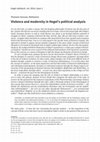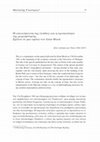Papers by Thanasis Giouras
Πλήρης μετάφραση των προσχεδίων, που συνοδεύεται από ιστορική αναδρομή και θεωρητική ανάλυση.
Bibliografische Information der Deutschen Nationalbibliothek Die Deutsche Nationalbibliothek verz... more Bibliografische Information der Deutschen Nationalbibliothek Die Deutsche Nationalbibliothek verzeichnet diese Publikation in der Deutschen Nationalbibliografie; detaillierte bibliografische Daten sind im Internet über http://dnb.dnb.de abrufbar.
Μια ανάλυση της ομιλίας του Max Weber 'Η επιστήμη ως επάγγελμα', από την οπτική της πολιτικής τοπ... more Μια ανάλυση της ομιλίας του Max Weber 'Η επιστήμη ως επάγγελμα', από την οπτική της πολιτικής τοποθέτησης της νεολαίας
Μια έρευνα για τη συζήτηση γύρω από την ομιλία του Max Weber Η επιστήμη ως επάγγελμα, συν τοις άλ... more Μια έρευνα για τη συζήτηση γύρω από την ομιλία του Max Weber Η επιστήμη ως επάγγελμα, συν τοις άλλοις στο πλαίσιο των μεσοπολεμικών αναζητήσεων για τη θέση της νεολαίας.

It is an old truth, or rather a truism, that the Hegelian philosophy of history was the first par... more It is an old truth, or rather a truism, that the Hegelian philosophy of history was the first part of the ‚system' that did not succeed in standing the test of time: even in the period right after Hegel's death, European history as well as world history was about to go through hitherto unheard of struggles in which ‚commerce followed the flag' and the ‚flag' did not take long to follow ‚commerce', struggles which had little in common with some kind of Geist that expands and recognizes itself in the historical time. True as it is with regard to the specific forms of historical change, this approach is bound to appear narrow-minded compared to the more subtle concept of historical dynamics to be found in developed form in Hegel's philosophy. Indeed, the fact that the pragmatological, the realgeschichtliche dimension of Hegel's exposition is a rather poor sample of historical analysis,1 should not serve as proof of the ultimate backwardness of his historical conception, but on the contrary as a means of bringing to light the deeper mechanisms of historical change.
The use of general descriptive names, registered names, trademarks, service marks, etc. in this p... more The use of general descriptive names, registered names, trademarks, service marks, etc. in this publication does not imply, even in the absence of a specific statement, that such names are exempt from the relevant protective laws and regulations and therefore free for general use.

Η απογοήτευση της ελπίδας και η τροπικότητα της χειραφέτησης. Σχόλια σε μια ομιλία του Ernst Bloc... more Η απογοήτευση της ελπίδας και η τροπικότητα της χειραφέτησης. Σχόλια σε μια ομιλία του Ernst Bloch
This is a commentary on the speech delivered by Ernst Bloch on 17th November 1961 at the beginning of the academic semester at the University of Tübingen. The title of the speech was: Can hope be disappointed? The context of the speech specified not only Bloch's biographical adventures-having decided at that same year, together with his wife Karola, upon receiving the news of the building of the Berlin Wall, not to return to East Germany, where the couple had been living for the last twelve years-but also one of the key concepts of his philosophy: the concept of hope. The commentary sketches briefly the argumentative structures in Blochs oeuvre, focusing not only on the concept of hope, but also on his interpretation of the Marxian critique as a way of philosophizing necessary for any modern emancipatory political action.
Uploads
Papers by Thanasis Giouras
This is a commentary on the speech delivered by Ernst Bloch on 17th November 1961 at the beginning of the academic semester at the University of Tübingen. The title of the speech was: Can hope be disappointed? The context of the speech specified not only Bloch's biographical adventures-having decided at that same year, together with his wife Karola, upon receiving the news of the building of the Berlin Wall, not to return to East Germany, where the couple had been living for the last twelve years-but also one of the key concepts of his philosophy: the concept of hope. The commentary sketches briefly the argumentative structures in Blochs oeuvre, focusing not only on the concept of hope, but also on his interpretation of the Marxian critique as a way of philosophizing necessary for any modern emancipatory political action.
This is a commentary on the speech delivered by Ernst Bloch on 17th November 1961 at the beginning of the academic semester at the University of Tübingen. The title of the speech was: Can hope be disappointed? The context of the speech specified not only Bloch's biographical adventures-having decided at that same year, together with his wife Karola, upon receiving the news of the building of the Berlin Wall, not to return to East Germany, where the couple had been living for the last twelve years-but also one of the key concepts of his philosophy: the concept of hope. The commentary sketches briefly the argumentative structures in Blochs oeuvre, focusing not only on the concept of hope, but also on his interpretation of the Marxian critique as a way of philosophizing necessary for any modern emancipatory political action.
Αδαμάντιος Συρμαλόγλου, Φορολογία, δημοκρατία και συγκρότηση
κράτους. Ο Λάμπρος Κορομηλάς και το «Έσοδα και φόροι»,
Μεταμεσονύκτιες Εκδόσεις, Αθήνα 2021.